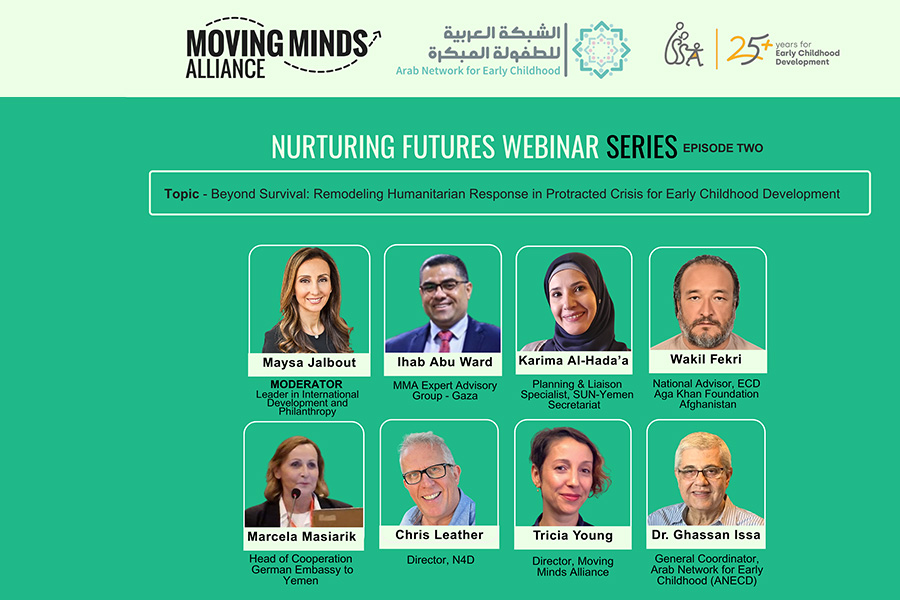We Communicate For Happy Children
 Second Nurturing Futures Webinar: “Beyond Survival—Remodeling Humanitarian Response for ECD in Protracted Crises”
Second Nurturing Futures Webinar: “Beyond Survival—Remodeling Humanitarian Response for ECD in Protracted Crises” 
30 June 2025
The Arab Network for Early Childhood (ANECD), the Moving Minds Alliance (MMA), and the International Step by Step Association (ISSA) co-hosted the second session in the Nurturing Futures Webinar Series titled “Beyond Survival: Remodeling Humanitarian Response in Protracted Crisis for Early Childhood Development”.
This five-part, bimonthly series—organized by MMA—features one-hour episodes designed to bring together diverse voices from across sectors and regions. The aim is to foster dialogue, reflection, and action-oriented collaboration to advance equitable and dignified access to holistic nurturing care for young children affected by crisis.
The webinar explored the limitations of the current humanitarian response framework, emphasizing the urgent need to move beyond mere survival toward more holistic approaches that support the overall well-being of young children in crisis.
Experts and frontline workers from Yemen, Gaza, and Afghanistan shared real-world and practical insights on how they are pushing the boundaries to deliver comprehensive nurturing care in protracted emergency settings. The discussion also included policy perspectives on shifting from short-term, reactive solutions to long-term, sustainable impact. Participants learned how local actors are leading transformative efforts on the ground, while global stakeholders are working to reshape humanitarian systems to be more child-responsive and developmentally appropriate.
Addressing Long-Term Needs of Young Children in Crisis
Speakers from various organizations and countries highlighted major gaps in how international aid addresses early childhood development (ECD) during prolonged crises. While aid helps survival, it often ignores children’s long-term developmental needs. Young children in extended conflicts or displacement suffer setbacks in health, learning, and wellbeing. Coordination across sectors is weak, and local actors—key to culturally relevant care—are underfunded or sidelined. Experts stressed the need to shift from short-term fixes to integrated, community-led nurturing care.
Speakers also called for urgent reforms to make ECD a core part of humanitarian planning and funding. They emphasized flexible, multi-year support for local organizations and better integration of health, nutrition, education, and protection sectors.
Challenges in the Gaza Strip and Yemen were also discussed. In Gaza, damaged infrastructure, trauma, and disrupted services leave millions of children vulnerable, with many losing education and facing unequal access. Yemen’s parallel humanitarian and government systems limit effective ECD responses, leaving millions of children out of school and malnourished. The webinar underscored empowering governments, improving cross-sector collaboration, and amplifying community voices as vital for sustainable, child-centered solutions.
ECD: A Lifeline Amid Protracted Crises
ANECD general coordinator Dr. Ghassan Issa presented the webinar’s final remarks. He emphasized that while survival is the immediate concern for millions of young children caught in protracted crises—from Gaza and Yemen to Sudan, Syria and beyond—it is only the first step in a lifelong struggle to thrive. He highlighted that ECD remains critically underfunded and fragmented in humanitarian responses, despite its fundamental role in resilience and recovery. The current global context is marked by overlapping crises—conflict, displacement, climate breakdown, economic instability, and pandemics—that compound challenges for vulnerable children, making ECD more essential than ever as a lifeline rather than a luxury.
Issa called for a transformative shift in how international aid approaches ECD, urging to integrate ECD into coordination mechanisms and connecting health, nutrition, learning, and protection in a coherent, child-centered approach.
He also stressed the need to move beyond short-term, disconnected interventions and to empower governments to lead sustainable, regionally grounded ECD strategies. Moving forward requires not only technical solutions but bold leadership, strategic funding, and collaborative partnerships that prioritize children’s rights and potential amid complex crises. The message was clear: investing in young children is not optional—it is essential to breaking cycles of trauma and building resilient communities. His final call was urgent and resolute: stop all wars on children now!
You may watch the full webinar here.
